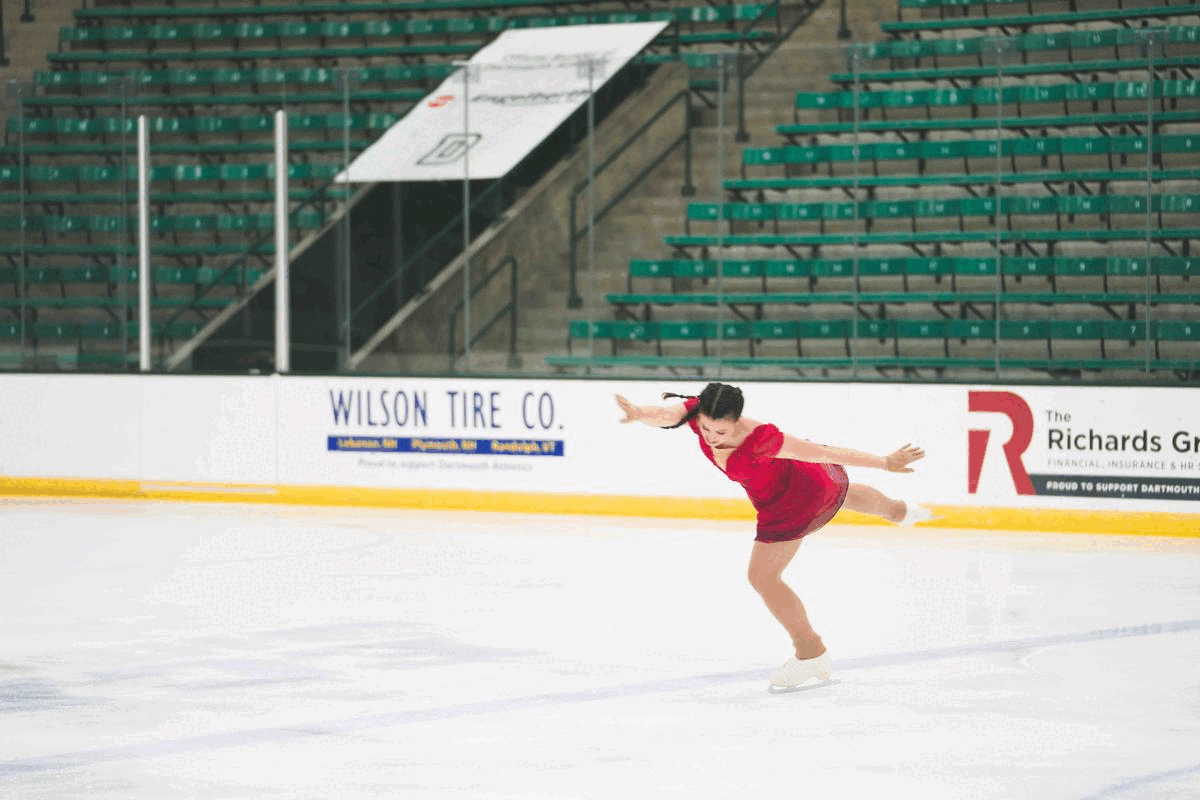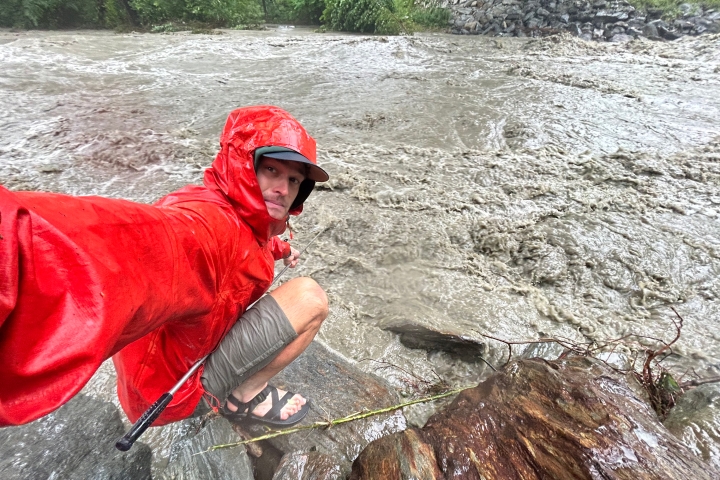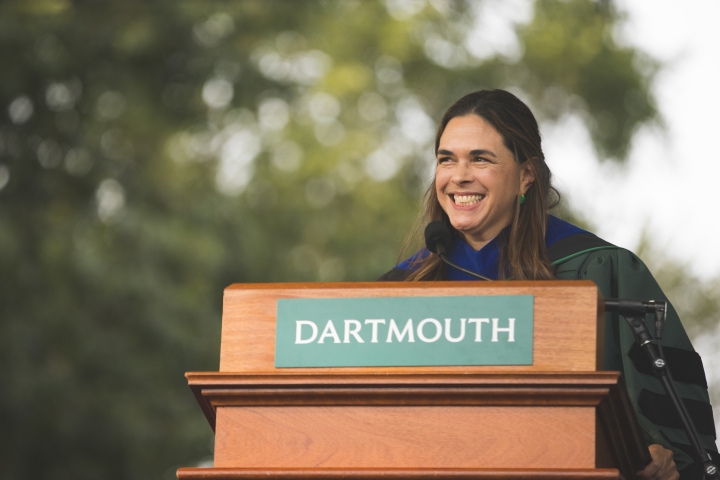It was a year of change and growth as Sian Leah Beilock took office as Dartmouth’s 19th president, and the first woman elected to the job, and faculty, students, and staff embraced celebrations and opportunities on campus and in the world.
Dartmouth News was there for it all. Here are some of the stories we featured this year:
Winter
Arrrrr! Treasure Island-style pirates invaded the Green for Winter Carnival, which featured ice sculptures, human dogsled races, and the (nonobligatory) frigid leap into Occom Pond.
Winterim students traveled to Berlin to learn about Jewish life in Central Europe, to the Texas-Mexico border to gain insight on U.S. immigration issues, and to an eye clinic in India to present original research proposals.
Back on campus, more than 200 people participated in the launch of Toward Equity, Dartmouth’s strategic plan for diversity, equity, inclusion, and belonging. Dartmouth Engineering was recognized for progress toward its DEIB goals, and the E.E. Just Program continued its work to increase minority representation in STEM disciplines.
Dartmouth welcomed 29 new faculty members in the 2022-23 academic year and 43 in 2023-24, while 13 professors retired from teaching.
Outgoing President Philip J. Hanlon ’77 continued to teach in his final year in office, and the community celebrated his decade of service.

Ukrainian artists were front and center at a reception for an exhibition of wartime illustrations. #MeToo movement founder Tarana Banks delivered the keynote at the Martin Luther King Jr. celebration. Black Legacy Month included a talk by She’s Gotta Have It star DeWanda Wise. And Iranian American journalist and women’s rights activist Masih Alinejad spoke about civil disobedience in Iran—part of a yearlong student-organized Democracy Summit.
In the world of innovation, Dartmouth celebrated the life-saving breakthrough that helped make the COVID-19 vaccines possible. Physics professor Robert Fesen captured images of colliding stars. Dartmouth researchers at the Guarini School of Graduate and Advanced Studies and in Arts and Sciences discovered why nectar-eating bats have long whiskers, gained insight into how individuals synchronize with other minds, and analyzed the relationship between wage growth and unemployment.
In collaboration with the Office of the Provost, the Hop distributed about $100,000 in grants for student and faculty projects that integrated the arts into research. And to help close the gap between medical research and treatment, Geisel School of Medicine launched a new center for implementation science.
The new year brought a major leap forward in artificial intelligence, about which faculty, staff, and students were not shy to voice opinions and predictions. And, as the year developed, Dartmouth took several steps to advance AI research in a variety of fields. In infrastructure news, after a nearly three-year closure for the COVID-19 pandemic and renovations, the 138-year-old Rollins Chapel reopened in January—in time for the multifaith chapel to double as one of several performance venues for the Hopkins Center for the Arts, which closed for its own renovation and expansion. A fire in a Remsen Medical Sciences Building laboratory caused some damage but no injuries. The Academic Skills Center and the Student Wellness Center moved into a new shared space in Baker-Berry Library, complete with therapy dogs and a tranquility room.
Spring
As the undergraduate term began, the Dartmouth community got its first glimpse of the incoming Class of 2027, selected from a record pool of applicants.
Undergraduates traveled the world to learn about entrepreneurship, make music in Mexico City, and explore Appalachia and an energy sector in transition.

On the Green City FSP in Berlin, engineering students studied sustainability and German language and culture. MBA students at Tuck explored the world of business on Global Insight Expeditions to Brazil, Chile, Denmark, the United Arab Emirates, and Vietnam.
On campus, the community observed Mental Health Awareness Month. The Dartmouth African Students Association sponsored a weeklong celebration of African cultures. The 2023 Pride celebration for the LGBTQIA+ community featured a parade. A delegation of senior monastic Dharma teachers from Zen master Thich Nhat Hanh’s Deer Park Monastery spent a week teaching mindfulness. Seven individuals and organizations were recognized at the annual Social Justice Awards ceremony.
Dartmouth’s Mellon Mays Program continued its record of success. Students in the Policy Research Shop advised New Hampshire judges on the effectiveness of criminal mediation. A Dartmouth study reported on how the COVID-19 pandemic exacerbated pregnant people’s fear of childbirth.
After an internal review discovered previously unreported Native American ancestral remains at Dartmouth, the institution brought in external experts, convened a working group, and provided spiritual cleansing of buildings where the remains had been housed. At the annual Powwow, Dartmouth repatriated a 19th-century cedar bark headdress to the Gitxaała Nation.
Then-President-elect Beilock and Thayer Dean Alexis Abramson joined a public call to expand and diversify the semiconductor workforce, issued by more than a dozen women university presidents and deans of engineering who have formed the EDGE Consortium. At the Wetterhahn symposium celebrating undergraduate science research, Beilock gave a keynote address on the impact of stress on academic performance.
Researchers from OpenAI and Google Research were on hand to lecture on the latest developments in artificial intelligence. Students studying race, power, and politics with Professor Sunmin Kim created an exhibition on the history of Asian American student activism at Dartmouth. Tuck offered 24 new electives on everything from generative AI and the future of work to international climate negotiations.
In climate news with a sports twist, a Dartmouth-led study showed the surprising link between global warming and an increasing number of home runs. A fourth-year medical student at Geisel led a study uncovering the pay gap between female and male physicians, and Geisel students learned about the importance of body language in how doctors communicate with patients.
On the AI front, the Center for Precision Health and Artificial Intelligence opened with a mission to advance research into how biomedical data can improve patient outcomes. The basement of North Fairbanks was converted into a Data Experiences and Visualizations Studio.
Now for a little game theory—as taught in Associate Professor Feng Fu’s popular math class. Fu and colleagues published a paper on how to apply game theory to stand up to bullies. In other research news, two Dartmouth Engineering professors led efforts to improve everyday technology, DALI teams helped a Geisel professor build a smart microscope, and a Guarini student developed an online interactive 3D model of New Hampshire’s iconic Old Man of the Mountain, a granite formation that collapsed in 2003. Biology faculty discovered how a protein influences plant growth. Computer science faculty and Guarini students designed aquatic robots, and researchers warned that climate change is bringing more extreme precipitation events to the Northeast.
The Office of Communications celebrated its student interns and the contributions they have made. Geisel celebrated its 2023 graduates at a class day ceremony in May, and Guarini, Thayer, and Tuck celebrated their grads at investiture ceremonies in June.

And at Commencement on June 11, more than 1,200 undergraduates and nearly 800 graduate and professional school students received degrees at a ceremony whose highlights included a two-for-one address from Oscar-winning filmmaking duo Phil Lord ’97 and Chris Miller ’97; a speech by Jonathan Lee ’23, one of 13 valedictorians in the Class of 2023; and a farewell address from outgoing President Hanlon.
Sweet Summertime
President Beilock started work on June 12 and moved into her new office in Parkhurst for her first day on the job, in time to celebrate reunions and the start of Sophomore Summer—and to respond to the U.S. Supreme Court’s ruling on affirmative action.
President Beilock joined Thayer faculty and student leaders for a roundtable on leadership, inclusion, and innovation. Institutional Diversity and Equity hosted a forum on the role of diversity in higher education. The Institute for Black Intellectual and Cultural Life launched, led by English professor Kimberly Juanita Brown.
Geisel’s academic year kicked off with an orientation for master’s level students in public health and health care research. Tuck Compass, a new system designed to help business school students map out their trajectory at Tuck and beyond, launched in June. In July, Tuck and Geisel announced a collaborative new hybrid master’s degree program in health administration. Dartmouth Engineering started a new online master’s degree program in computer engineering.
Students and faculty were in Scotland to celebrate political economist Adam Smith’s 300th birthday. More than 30 students continued the Dartmouth Outing Club’s summer tradition of hiking “The Fifty” from Moosilauke to Hanover (warning: pictures of tired feet). Dartmouth Library conservators pitched in to help nearby Vermont towns rescue archives damaged in July flooding, and a Guarini earth sciences graduate student took advantage of the raging waters to study river sediment.

In addition to ongoing construction at the Hop, summer saw renovations to the façade of Dartmouth Library’s Rauner Special Collections Library as well as undergraduate residence halls in East Wheelock House and the expansion of Wi-Fi to the Green.
Dartmouth researchers worked on flexible robots that can work in unison to build a variety of structures. An astronomy major used data from NASA’s Transiting Exoplanet Survey Satellite to discover two new exoplanets. The National Institute on Aging awarded Geisel a major grant to study inequity in Alzheimer’s disease care. Montgomery Fellow and computer scientist Cal Newport ’04 lectured on how AI is changing workplaces and academia.
Students spurred research that apes and early humans likely evolved free-moving shoulders and flexible elbows to slow their descent from trees. And a study co-authored by Brendan Nyhan examined the role of “like-minded” sources on social media regarding the 2020 presidential election.

The 2024 U.S. presidential election campaign was up close and personal as candidates and other politicians of all persuasions made the rounds on campus as part of the Path to the Presidency series, which continues to draw candidates to campus as next month’s New Hampshire primary approaches.
Audience participation was encouraged at performances of the Hop-commissioned NOISE (a musical), written by award-winning composer and assistant professor of music César Alvarez.
The Call to Lead campaign wrapped up at the end of the fiscal year with more than $3.7 billion in gifts and the participation of 60% of undergraduate alumni—including an unprecedented $500 million for scholarships and the largest gift ever committed to Dartmouth athletics, announced in the campaign’s final month. For its part, the Tuck School of Business raised a record $416 million for scholarships and other strategic priorities.
Fall Colors
Inauguration made it official: At the Sept. 22 celebration on the Green, President Beilock—the first woman in 254 years to serve in the Wheelock Succession—laid out her priorities for improving mental health, creating “brave spaces” for dialogue, investment in innovation and impact, action on climate change, and a rededication to building lifelong Dartmouth connections. Also high on the agenda: housing, including a plan to build undergraduate residences on West Wheelock Street.
The following week, the new president welcomed the current surgeon general and his seven living predecessors to a historic discussion of the national mental health crisis.

Dartmouth also hosted symposiums on digital mental health and AI and digital therapeutics and an international conference on vaccines, and joined an international alliance for responsible innovation in AI. The Susan and James Wright Center for the Study of Computation and Just Communities got its first director.
As fall term got underway, President Beilock welcomed incoming undergraduates at a new ceremony on Memorial Field. Tuck’s incoming class included teachers, ballet dancers, and a national security adviser among a cohort of 297. Employers continued to have faith in Tuck’s value proposition, as evidenced by the 95% of 2023 graduates fielding offers within three months of leaving Hanover. Guarini welcomed a new cohort to the Society of Fellows.
President Beilock was a featured panelist at the Fortune Most Powerful Women 2023 Conference and helped lead the D.C. kickoff of the EDGE Consortium, the coalition of universities and engineering schools with women presidents and deans of engineering committed to expanding the engineering and technology workforce.
The Dartmouth community grieved the loss of Robert L. Blackman Head Football Coach Eugene “Buddy” Teevens ’79. Sammy McCorkle, who had been serving as acting head coach, was named to the position permanently, leading the team to its 21st Ivy title and garnering Ivy League Coach of the Year honors.

In October, Dartmouth published its strategic plan for student mental health and well-being, which revises the policy for time away for medical reasons, expands mental health education for faculty and staff, and calls for the creation of a chief health and wellness officer, among other initiatives.
Researchers used declassified satellite imagery to locate ancient Roman forts, found a paleolithic axe in a painting from the Renaissance, and used computer modeling to resolve the debate over what killed the dinosaurs. The Neukom Institute for Computational Science awarded its fifth annual playwriting prize.
As war broke out between Israel and Hamas, faculty in the Middle Eastern Studies and Jewish Studies programs came together to host forums on the crisis to help community members understand the context behind the violence and provide them with an opportunity to engage in dialogue. Dartmouth’s response gained national attention by the media, including National Public Radio and 60 Minutes.

Undergraduates in Assistant Professor Matthew Ritger’s Shakespeare class helped curate a Rauner Library exhibit celebrating the 400th anniversary of Shakespeare’s First Folio. The First-Generation Office in November organized the first-ever group photo inviting all 700-plus first gen students to gather in front of Baker Tower. The picture kicked of First-Gen at Dartmouth Celebration Week.
Dartmouth’s oldest improv theater group is going strong after nearly 30 years. Students in Dartmouth’s first Ukrainian language class collaborated with students in Ukraine. And as construction continues, the Hop made creative use of alternate venues.
Energy technology and policy expert Rose Mutiso ’08, Thayer ’08, was on campus during Dartmouth’s Climate and Energy Week to accept the McGuire Family Prize for Societal Impact. Cree artist Kent Monkman spoke at the Hood Museum about the museum’s exhibition of his paintings. National Security Agency Director Gen. Paul Nakasone spoke to students about balancing security and civil liberties.
Give a Rouse
In addition to President Beilock, there are some fresh faces in campus leadership this year, including a new executive vice president, the first-ever chief transformation officer, a chief compliance officer, a new leader for human resources, and a vice president for government and community relations. Former trustee and education leader and strategist S. Caroline Kerr ’05 was appointed special advisor to the president for strategic and new initiatives. The deans of the Thayer School of Engineering and Tuck School of Business were both reappointed to their jobs.
TV showrunner Shonda Rhimes ’91 joined the Board of Trustees along with David McKenna ’89 and Todd Sisitsky ’93. Rhimes was later also named—along with James Coulter ’82, Keith Dunleavy ’91, Steven Hafner ’91—as an inaugural honoree of the newly created Dartmouth Entrepreneurs Hall of Fame.
As Rhodes Scholars, Jessica Chiriboga ’24 and Zachary Lang ’23 will be studying environmentalism and philosophy, respectively, at Oxford next year. Through a Marshall Scholarship, Max Teszler ’23 will continue his study of plant biology at the University of East Anglia.
Jackelinne Claros Benitez ’24 and Ignacio Gutierrez ’25 were chosen as John Robert Lewis Scholars. Two students—Samantha Palermo ’24 and Mahin Alam ’26—won Gilman Scholarships. Palermo also received a Newman Civic Fellowship. John Keating ’23 received a Gaither Junior Fellowship, and Claire Rafson ’19 was named a Knight-Hennessy Scholar. Students also won Goldwater Scholarships, Voyager Scholarships, awards from the Udall Foundation, Fulbright awards to study or teach in 15 countries, and National Science Foundation Graduate Research Fellowships. Postdoctoral researcher Patrick LaChance, Guarini ’22, won the 2023 Donald B. Lindsley Prize in Behavioral Neuroscience, awarded by the Society of Neuroscience. Guarini computer science PhD candidate Kate Salesin won a grant from the Future Investigators in NASA Earth and Space Science Technology. And microbiologist Caitlin Kowalski, Guarini ’20, won a L’Oréal Women in Science award.
Rugby star Ariana Ramsey qualified for the 2024 Olympics on the U.S. team—her second tour as an Olympian—as the women’s rugby team won the Ivy 7s championship. And the Academy of American Poets named Edgar Morales ’24 a “most promising young poet.”
Engineering professor Weiyang “Fiona” Li and biologist Caitlin Hicks Pries won National Science Foundation CAREER grants, the foundation’s most prestigious honor for early-career faculty. Assistant Professor of Engineering Mattias Fitzpatrick earned a DARPA Young Faculty Award. Molecular geneticist Mary Lou Guerinot was elected to the National Academy of Sciences governance council.
Film and media studies assistant professor Iyabo Kwayana’s animated experimental film screened at Sundance and on PBS. Mariah Eli Hernandez-Fitch ’23’s film Ekbeh—made for her senior thesis—will show at Sundance in 2024. Award-winning photojournalist James Nachtwey ’70, a provostial fellow, was featured on CBS’s 60 Minutes, and alumni in the entertainment industry were responsible for more than a half-dozen major film and television releases, including Lord and Miller’s Spider-Man: Across the Spider-Verse, which debuted in June.
